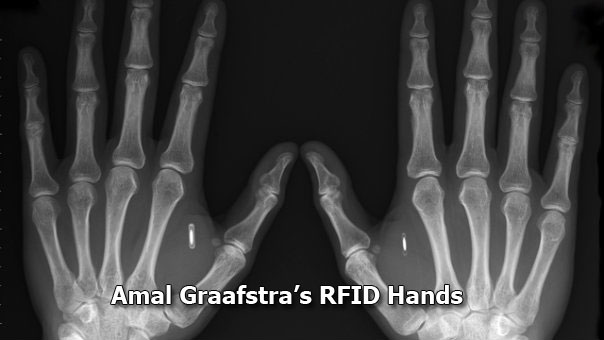It took a while, but Graafstra eventually found a glass encased, passive UHF tag about the size of a grain of rice (from Philips) that, while not approved for implantation, seemed like a potentially good fit. It had advanced encryption, for example, one of Graafstra’s important criteria. He even experimented with a few light hammer hits to test the transponder’s ruggedness, and found it took quite a wallop to shatter the tag.
Not long after, after signing a waiver, he found a doctor who was willing to first sterilize the tags, make incisions, and put the transponders in each of Graafstra’s hands, as X-Ray photos show below. After the small incision, the tag is implanted using s syringe loaded with the chip.
Of course, to solve the original lock problem, there is no need to have RFID tags embedded under the skin, Key fobs, ID cads or similar media are already in widespread use for security type applications.

However, Graastra says,” if the tag is implanted in your body, I reasoned, so much the better: it's impossible not to have it when you need it."
Buying a series of relatively low cost UHF readers, soon Graafstra was controlling access to a variety of things around his home by simply waiving on hand or the other in front of a reader. He later installed an RFID access system to allow him to enter his girlfriend’s home in the same manner – which ultimately, if initially reluctantly, led her to have RFID tags implanted in her hands as well. The read range is 5-7 centimeters, he says.
The couple that RFIDs together stays together, we have heard.
VeriChip Already in the Business
It turns out there is already a commercial company focused on human implantable RFID chips for a variety of applications.
VeriChip, offers systems where implanted people can pay for drinks and gain access to VIP rooms in clubs using their implant and other kinds of similar programs. It has some success with the concept in certain areas of the globe, but nothing so far in the US. It also offers implantable chips for medical records purposes, such communicating that an unconscious accident victim has diabetes or a heart condition.
Of course, privacy concerns come in to play, and Graafsta says he received hundreds of often scathing emails accusing him of helping to enable a “Big Brother” society where humans are tracked by the government night and day.
“If such readers proliferate, and there would be many incentives to install them, we would find ourselves in a surveillance society of 24/7 mass tracking,” said Jay Stanley, senior policy analyst for the speech, privacy and technology program at the American Civil Liberties Union. He adds that “Many people find the idea creepy.”
But Graafstra himself says that his journey with RFID is at least voluntary, whereas in London and soon other cities nearly the entire urban area is under video surveillance – and facial recognition technology is being widely deployed to identify humans as needed.
What’s your reaction to Graafstra’s RFID hands? Is this just a gimmick, or do you think many other may make such a move? Is this a path the Big Brother? Let us know your thoughts at the Feedback button below.